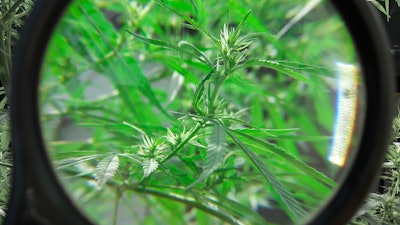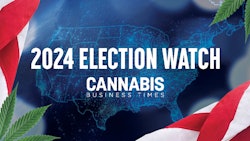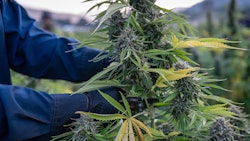
In December 2018, Congress passed the Agriculture Improvement Act of 2018 (the “Farm Bill”), legalizing the version of the cannabis sativa L. plant colloquially known as hemp at the federal level in the United States. Following passage of the Farm Bill, hemp and products derived from the hemp plant could be freely shipped across state lines.
Hemp is naturally higher in CBD than marijuana. Unsurprisingly, the first wave of hemp-derived products (edibles, cosmetics, etc.) following passage of the Farm Bill primarily featured CBD. However, scientists have known for a long time how to convert CBD to other cannabinoids, including THC. So, the next wave of hemp-derived consumer products largely contained THC, and these products have proven to be very popular with consumers across the country. Because of the way the Farm Bill was written, hemp-derived products containing even intoxicating levels of THC have been found to be legal at the federal level.
In response to the proliferation of hemp-derived THC products, certain states have taken steps to further regulate hemp products. Some states, such as Minnesota, have chosen to implement their own, distinct regulatory frameworks for hemp products. These states allow the sale of hemp products containing THC that meet certain regulatory requirements. Other states have chosen to greatly restrict or completely ban hemp-derived products containing THC. One example is New York, which implemented emergency regulations in 2023 capping total THC content in hemp-derived products at 2 milligrams. When those emergency regulations were invalidated by a court in December 2023 (in N. Fork Distribution, Inc. v. New York State Cannabis Control Bd.), New York implemented permanent regulations that are still in effect.
More recently, New Jersey, Missouri, and California have sought to impose strict regulations on hemp products. Lawsuits challenging the new regulations followed in each of these states. Here is a closer look at the various legal challenges mounted against these new regulations and the outcomes or those yet to be determined.
New Jersey
New Jersey amended its hemp law on Sept. 12, 2024, with the stated goal of preventing the sale of THC-containing products to children. To that end, the state outlawed the sale of hemp products containing THC to individuals under 21. In addition to this change, while New Jersey had previously followed the Farm Bill’s definition of hemp, it amended its definition of “hemp” and “hemp product” as having no more than 0.3 percent total THC on a dry weight basis.
Under New Jersey’s amended hemp laws, hemp products now must have no more than 0.3 percent total THC on a dry weight basis and no more than 0.5 milligrams of total THC per serving and 2.5 milligrams of total THC per package. Hemp-derived products that meet these requirements are legal in New Jersey. But the state specifically chose to exclude from its new definition of “hemp product” any “intoxicating hemp products,” which, in addition to encompassing products with a greater THC content than permitted by the definition of “hemp product,” only applies to those products made and sold in New Jersey. This had the effect of making “intoxicating hemp products” state-legal “cannabis items” under New Jersey law, rather than simply “hemp products.”
Two weeks after these amendments became law, a collection of hemp growers and manufacturers filed a lawsuit, Loki Brands, LLC, v. Platkin, challenging them in the United States District Court for the District of New Jersey. First, the plaintiffs contended that New Jersey law was federally preempted, i.e., the new amendments conflicted with the Farm Bill because the Farm Bill does not allow states to stop the shipment of hemp through the state, even if the state does not allow for the sale of that hemp within its borders. By defining “intoxicating hemp products” to only include hemp products cultivated and manufactured in New Jersey, only New Jersey-made “intoxicating hemp products” were excluded from the state’s list of controlled dangerous substances. Therefore, the amendment had the effect of making it a de facto felony to ship hemp products with greater than 0.5 milligrams of total THC through New Jersey, in direct conflict with the Farm Bill.
Second, the plaintiffs contended that New Jersey’s law violated the Dormant Commerce Clause because it treated hemp products made out-of-state differently than those made in-state. Because intoxicating hemp products made in New Jersey can be sold as cannabis, but out-of-state intoxicating hemp products cannot, the hemp operators argued that the definition was unconstitutional and improperly discriminated against out-of-state products.
The plaintiffs sought to enjoin the New Jersey amendments. The court converted the plaintiffs’ motion for a preliminary injunction into a motion for summary judgment. Then, in an opinion filed on Oct. 10, the court agreed with the plaintiffs on both fronts and overturned the state legislature’s definition of “intoxicating hemp products” to the extent the amended definition prevented out-of-state products from being shipped through New Jersey or sold via New Jersey’s cannabis markets.
An update on the state’s Cannabis Regulatory Commission’s website announced the court’s decision: “Due to a court order issued on October 10 in Loki Brands LLC et al. v. Platkin et al., No. 24-cv-9389 (D.N.J.), the State is unable to begin enforcement of these provisions at this time. However, the provisions prohibiting sale to those under 21 remain in effect. The court’s decision is being reviewed, and any further developments will be posted as they become available.”
As of this writing, it is unclear whether the New Jersey legislature will further amend the state’s hemp laws. The court’s opinion suggests some options do exist – including for the state to permit but regulate out-of-state intoxicating hemp-derived products, i.e., not discriminate against out-of-state products. Recent reporting out of New Jersey suggests that the authorities there currently do not intend to crack down on hemp-derived THC products as long as they are not sold to customers under 21 years of age.
Missouri
In August 2018 (before passage of the Farm Bill), Missouri enacted its industrial hemp program with the passage of HB 2034, which adopted a definition of “hemp” that largely tracked the subsequently adopted Farm Bill and added Missouri Revised Statute section 196.070.2, which states that “[a] food shall not be considered adulterated for containing industrial hemp, or an industrial hemp commodity or product.”
On Aug. 1, 2024, Gov. Mike Parson issued Executive Order 24-10, which directed the state’s Department of Health and Senior Services (DHSS) to find that foods containing hemp-derived THC or other “unregulated psychoactive cannabis products” are “deleterious, poisonous and adulterated” under Missouri Revised Statute section 196.070 and to embargo foods containing such substances unless the products fell under the purview of the state’s Division of Cannabis Regulation. In response, DHSS announced that beginning on Sept. 1, it would begin inspecting retail establishments and placing embargo labels on products it deemed adulterated or so misbranded as to be dangerous or fraudulent. True to its word, the state began making inspections and adding embargo labels, most prominently at the Veterans of Foreign Wars (VFW) Post in Franklin County on Sept. 11.
On Aug. 30, the Missouri Hemp Trade Association (MHTA) filed, in Missouri Hemp Trade Association v. Missouri Department of Health and Senior Services, a petition for declaratory judgment, preliminary injunction and permanent injunctive relief to restrain DHSS from implementing Executive Order 24-10. The MHTA asserted that the products subject to the embargo were, by statutory definition, not adulterated, and therefore any embargo preventing the sale of such products was unlawful and a taking of its members’ property. The MHTA also contended that the DHSS announcement violated the Missouri Administrative Procedure Act by promulgating a rule without following the state’s rulemaking procedures.
On Sept. 16, the MHTA filed for a temporary restraining order (TRO) following the inspection at the Franklin County VFW Post. The following day, the DHSS released a letter acknowledging that section 196.070.2 precluded a finding that a food product was adulterated solely on the basis that it contained hemp-derived THC. It further stated that, rather than continuing to tag and embargo such products, it would instead direct its efforts toward identifying misbranded products that were attractive to children because they could be mistaken for candy or regular food. On the basis of the DHSS letter, the Circuit Court of Cole County denied the TRO (which became unnecessary following the DHSS letter) and set a case management conference for Nov. 4, on the MHTA’s original petition.
The ultimate outcome of Missouri Hemp Trade Association v. Missouri Department of Health and Senior Services remains to be seen. But this much is clear: The state of Missouri has not given up its fight against hemp-derived THC products. Earlier this month, following DHSS’s release of its letter, the agency requested funding to implement Executive Order 24-10. If approved by the Missouri General Assembly, the funding would become available for enforcement efforts beginning on July 1, 2025.
California
In 2021, California Gov. Gavin Newsom signed AB 45 into law, which regulated and permitted the sale of many industrial hemp products. Less than three years later, however, over concerns that “intoxicating” hemp products were being “peddled” to children, Newsom announced emergency regulations banning “detectable” THC or any “comparable cannabinoid” in industrial hemp final food, beverage, and dietary supplement products; imposing an above-21 age restriction for the offer or sale of the remaining permitted industrial hemp non-final food products; and limiting the serving and package sizes of these products. The emergency regulations took effect on Sept. 23.
On Sept. 24, hemp business advocacy organization U.S. Hemp Roundtable, as well as individual hemp operators, filed a lawsuit (U.S. Hemp Roundtable, Inc. v. California Department of Public Health et al.) in Los Angeles County Superior Court against the California Department of Public Health (DPH), challenging the emergency regulations on grounds that they violate the state’s Administrative Procedure Act and existing state law. Like the Loki petitioners, the plaintiffs in this California case argued that California’s regulations are preempted by the Farm Bill. And, like the MHTA petitioners, the plaintiffs in the California case sought a TRO to enjoin the regulations from being implemented pending a decision on the merits of the case.
On Oct. 11, the judge in the case denied the plaintiffs’ TRO application. The court found that there was no demonstration that the emergency regulations would cause irreparable harm because the economic harm complained of was still speculative, and operators could still sell THC through the state’s legal cannabis system (provided they are properly licensed). The court also found that the state had demonstrated that the potential harm to Californians, especially children, outweighed any potential harm to hemp operators because the emergency regulations had been enacted in response to complaints to DPH of illness and injury involving industrial hemp products, including the death of a child who had consumed gummies containing THC.
The court also found that the plaintiffs had not demonstrated a likelihood of success on the merits – meaning, at this stage in the litigation, there is still a genuine question of whether the plaintiffs will ultimately prevail. First, the court determined that under the state’s Health and Safety Code, DPH had the authority to adopt the regulations on an emergency basis, founded on circumstances that made it necessary to address serious harm to public health and safety with immediate action. Second, the court also rejected the argument that the regulations conflicted with AB 45’s definition of hemp, as DPH was authorized under state law to include intoxicating cannabinoids in its definition of THC and place limits on the total THC concentration in products intended for human consumption.
Finally, the court rejected the plaintiffs’ argument that the emergency regulations are preempted by the Farm Bill because they impose a more restrictive definition of “hemp” at the state level. The court pointed to the Farm Bill’s specific directive that the statute does not preempt or limit “any law of a State or Indian tribe that [¶] regulates the production of hemp; and [¶] is more stringent” than the Farm Bill. In short, according to the court’s order denying the plaintiffs’ TRO application, “the State of California can prohibit the manufacture, storage, and sale of hemp final form food products containing THC within its borders.”
For now, the governor’s emergency regulations remain in effect until their sunset on March 25, 2025. The next step in litigation will be a trial-setting conference on Nov. 22, 2024. In the meantime, California authorities are reportedly taking steps to enforce the emergency regulations, including seizing hemp-derived THC products from stores in California.
Key Takeaways
While it is difficult to predict how these cases or other future cases will ultimately be resolved, a few things are coming into focus.
The first is that state governments want to prevent hemp-derived THC products from getting into the hands of people under 21 years of age. This of course mirrors the existing rules for alcohol nationwide, and cannabis in all 24 states where it has been legalized for adult use.
Another takeaway is that courts are not too receptive to the argument that the Farm Bill preempts the states’ ability to enact strict regulation of hemp-derived products, up to and including bans. Notably, the question of preemption and whether states (specifically, Arkansas) have the authority to redefine which hemp products are lawful or not is currently pending on appeal before the U.S. Court of Appeals for the Eighth Circuit in Bio Gen LLC v. Sanders. The outcome of the Bio Gen case could influence other states’ approaches to regulating hemp-derived THC products.
Further, as more states seek to restrict hemp-derived THC products, it can be expected that more lawsuits making similar arguments will follow. On Oct. 18, 2024, a lawsuit was filed challenging Louisiana’s limits on hemp products. A number of other states, such as Georgia, have recently passed or are in the process of creating legislation or regulations restricting hemp-derived THC, which could lead to additional litigation.
Finally, the Farm Bill itself expired on Sept. 30, without Congress passing an extension or a new Farm Bill. For now, the definition and legal status of hemp from the Farm Bill is still the law of the land, but it is unclear whether Congress will take the same approach to hemp in the next Farm Bill, or if new restrictions will be implemented at the federal level.


























